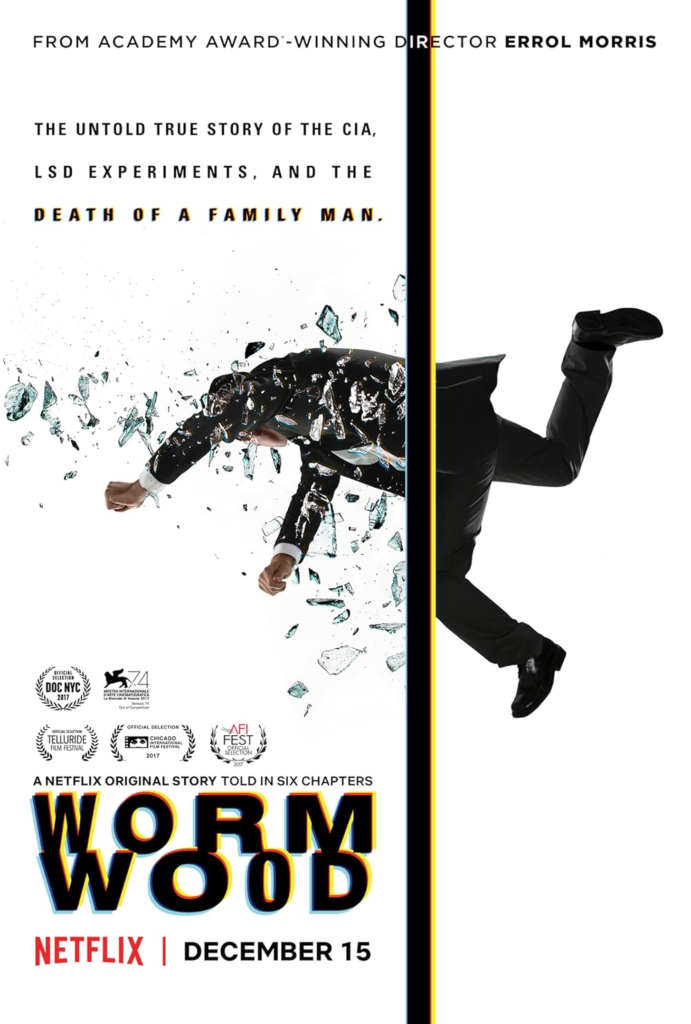Wormwood Christian Review

At first glance, Errol Morris’ Wormwood doesn’t feel like a typical documentary. It’s not a straightforward recounting of historical events but more like a slow dance with mystery, deception, and grief. The story of Frank Olson, a U.S. government scientist who died under strange and suspicious circumstances in 1953, doesn’t lend itself easily to any single genre or approach. Morris blurs the lines between documentary, fiction, and something else entirely, pushing viewers to rethink what they expect from a documentary—and, really, what they expect from the truth itself.
For Christians approaching Wormwood, the tension is obvious. How do you grapple with something that teeters so precariously on the edge of trust and betrayal, hopes and despair, clarity, and confusion? And how do you engage with a work that seeks to expose some of the darkest corners of American history—without getting swallowed up in that same darkness?
The Importance of Truth
Right off the bat, Wormwood taps into a deeply Christian value: truth. The Bible is filled with calls to truthfulness and integrity (Ephesians 4:25, Proverbs 12:22), and the consequences of deception are often painted vividly. Frank Olson’s story revolves around the idea that the U.S. government, in its Cold War paranoia, wasn’t always forthright with its people—especially with its own. Olson, a scientist involved in biological warfare research, became an unwitting participant in a CIA mind-control experiment involving LSD. Nine days later, he was dead, having allegedly leapt from a New York hotel window.
But was it a suicide? That’s the question at the heart of Wormwood. And it’s the question Olson’s son, Eric, has been grappling with for decades. For him—and for Morris as a filmmaker—getting to the truth of what happened to Frank Olson is not just a personal mission; it’s a moral one. There’s something almost biblical about it, this relentless pursuit of truth in the face of institutionalized secrecy. Christians watching this series may find themselves reflecting on the role of truth in their own lives. How often do we settle for convenient half-truths or turn a blind eye to uncomfortable facts because they’re too hard to face? Wormwood doesn’t let its viewers off the hook that easily. It forces you to sit with the discomfort, just as Eric Olson has had to.
Darkness, Grief, and Redemption
But while truth is a central theme, the documentary doesn’t offer a neat, tidy resolution. In fact, much of Wormwood is about the fallout of truth—or the lack of it. Eric Olson’s decades-long quest to understand his father’s death has consumed him. His grief is palpable, and there’s something tragic about the way Morris captures it. Frank Olson’s death didn’t just take away a father; it set off a ripple effect that has touched every corner of his son’s life.
Christians are often taught to seek redemption in moments of pain. Romans 8:28 promises that God works all things together for good for those who love Him. But what happens when that redemption seems elusive? When the pain doesn’t lead to healing but to more pain, more questions, more mystery? Eric Olson’s story may not offer the kind of redemption we expect, and that can be hard to swallow from a Christian perspective. There’s a bleakness here that’s hard to shake.
Yet, in another sense, Wormwood can still speak to a Christian understanding of suffering and perseverance. Eric Olson’s journey, while fraught with frustration, is a testament to the human spirit’s refusal to give up. He hasn’t found all the answers, but he’s still looking. And there’s something admirable, even noble, about that persistence. It’s not the kind of redemptive arc you might find in a traditional story, but it’s there—quiet, understated, and deeply human.
Storytelling and Its Limits
Now, let’s talk about how Wormwood tells its story because that’s where things get really interesting—and maybe a little tricky. Morris doesn’t just give you a series of interviews and archival footage. He weaves in dramatizations, surreal imagery, and narrative experiments that almost blur the line between fact and fiction. It’s disorienting at times, deliberately so. One moment you’re watching a re-enactment of Olson’s final hours, and the next, you’re hearing Eric talk about his memories of his father. These shifts in tone and style can make it hard to know what’s “real” and what’s speculative, which is exactly the point.
As Christians, we’re called to be discerning in what we watch and how we interpret it. Philippians 4:8 reminds us to think on things that are true, noble, right, and pure. Wormwood challenges that framework by presenting a narrative that is, at times, intentionally elusive. It’s not trying to deceive, but it’s not handing you the truth on a silver platter either. Morris seems to be asking: What do you do when the truth is buried so deep in secrecy and lies that it’s almost impossible to uncover?
For some viewers, this kind of storytelling can be frustrating. We’re used to documentaries offering clear, definitive conclusions, and Wormwood doesn’t do that. Instead, it invites you into the uncertainty. It’s a narrative puzzle, one that reflects the complexity of the real-world mystery it’s exploring. From a Christian perspective, this can be a valuable exercise in humility. We don’t always get the answers we want, and sometimes, we have to live with the tension of not knowing.
Morality and Imagination
There’s another layer to Wormwood that’s worth considering: the moral implications of its story. The CIA’s involvement in mind-control experiments, the secrecy surrounding Olson’s death, the manipulation of truth—these are all ethical questions that feel particularly weighty in today’s world. Christians might find themselves reflecting on the broader implications of these themes. How do we, as a society, hold power to account? How do we ensure that truth isn’t sacrificed for convenience or control?
At the same time, Wormwood plays with the idea of imagination. Morris often conflates investigation with creativity, blurring the lines between fact and fiction. In doing so, he raises questions about how we construct our understanding of the past. From a faith perspective, this interplay between imagination and truth can be intriguing. After all, storytelling is a powerful tool in Scripture, with parables and metaphors often used to convey deep truths. But there’s also a fine line between using imagination to explore truth and distorting reality. Christians might feel a tension here, as Morris walks that tightrope with deliberate care.
Final Thoughts
Wormwood is not a comfortable watch, and it’s certainly not for everyone. Its heavy themes, intellectual style, and boundary-pushing storytelling might leave some Christian viewers feeling unsettled. But it’s also a fascinating exploration of truth, grief, and the moral complexities of power.
While it doesn’t offer easy answers or a neat resolution, it does invite deep reflection on the nature of truth and the human desire for justice. It’s a story that asks you to sit with discomfort and uncertainty, challenging you to think critically and compassionately about the world around you. In the end, Wormwood is a thought-provoking, nuanced work that, despite its flaws, is well worth the watch—for those ready to wrestle with its themes.
Rating: 7/10







